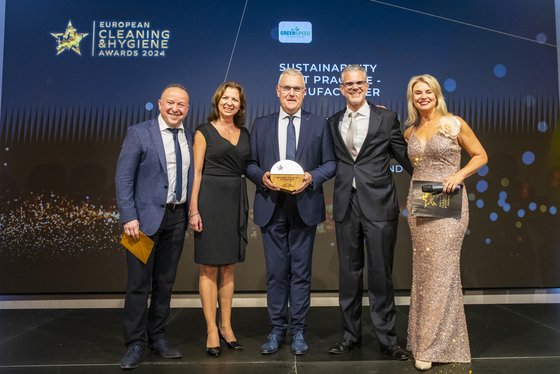WEPA Professional, a business unit of the WEPA Group, has won this year’s European Cleaning and Hygiene Award with the brand Satino, which includes the sustainable hygiene paper innovation Satino PureSoft.
The award is presented annually by the pan-European trade magazine for the professional cleaning industry, the European Cleaning Journal. The purpose of the award is to promote the highest professional standards and to recognise expertise within the industry.
Satino by WEPA triumphed over four other finalists in the manufacturer category "Sustainability – Best Practice," in recognition of their dedicated contribution to the professional cleaning sector. In 2023, Satino had already received the German Federal Ecodesign Award, the highest national accolade for ecological design, for the innovation of Satino PureSoft. As an expert in the production of hygiene paper from recycled fibres, Satino by WEPA continues to set new standards in sustainable hygiene paper innovations.
Satino PureSoft’s unbleached products – ranging from hand towels to toilet paper, tissues, and kitchen rolls – make a meaningful contribution by further utilising recycled fibres, turning cardboard into soft hygiene paper. Washroom visitors are offered a high-quality, sustainable alternative to conventional paper products made from virgin wood fibres. With approximately a 70%* smaller ecological fibre footprint compared to wood-based virgin fibres, Satino PureSoft offers a new, innovative product range for more eco-friendly practices, while maintaining the highest standards of comfort and quality.
"Following the German Ecodesign Award for Satino PureSoft and the Purus Innovation Award for GreenGrow last year, this recognition is continued proof that our brand Satino by WEPA offers outstanding sustainable concepts in the European market. This success is due to the passionate efforts of our entire team across all departments. We are all very proud of this award, which honours our collective commitment to greater sustainability," explains Patrick Schumacher, Managing Director of Business Development and Marketing at WEPA Professional GmbH.
*The ecological scarcity method is used to calculate the environmental footprint. This method, based on ISO 14040, considers a wide range of environmental impacts, such as pollutant emissions, resource consumption, and biodiversity loss related to land use for fibre production (Cradle-to-Gate). These aspects are summarised into a single metric.


